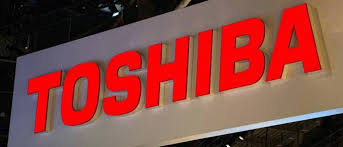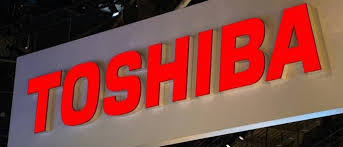
Investor attention to the Japanese group's efforts to fix that and other balance sheet headaches would be turned as Toshiba Corp, after bruising cost overruns at its U.S. nuclear arm, will detail a writedown of close to $6 billion.
A year after a $1.3 billion accounting scandal, warnings of a potential multi-billion dollar nuclear writedown was issued by the TVs-to-construction conglomerate in December.
Noting a sum which alone would wipe out the company's shareholder equity, the final charge be as high as 700 billion yen ($6.2 billion) and will be detailed alongside quarterly earnings, sources familiar with the matter say.
Along with the sale of a stake in its flagship memory chips business, Toshiba is also expected to outline the prospects for its nuclear arm and update investors on efforts to raise capital, as the company has seen its market value almost halve since the prospect of a writedown emerged in December.
"The question for Toshiba is how is it going to move forward," said Masahiko Ishino, analyst at Tokai Tokyo Research Center.
Given its battered balance sheet, how it could stay competitive in the cash-generating but capital-intensive memory chip industry has to be shown by Toshiba, he added.
Including rivals Bain Capital, SK Hynix and Micron Technology, Toshiba has offered a 19.9 percent of its prize chips business to investment funds and other business.
In a range that could cover the 300 billion yen the company wants to raise, Toshiba had received bids of between 200 billion yen to 400 billion yen for the flash memory stake, a source said on Thursday.
Japan's business establishment is represented partly by Toshiba. It made Japan's first light bulb and was a pioneer in laptop computers after it was born in the tumult of Japan's emergence from centuries of isolation. Toshiba could be too big to fail with 190,000 workers, employed at some 500 units.
Toshiba could face protracted pain like other established Japanese firms, such as liquid crystal display inventor Sharp Corp, which have dodged financial collapse.
Problem businesses within Toshiba beyond nuclear, including Landis+Gyr AG, were pointed out by financial sources last week.
To tap smart grid demand that at the time was expected to grow six-fold to around $70 billion in 10 years, Toshiba agreed to buy that unlisted meter maker for $2.3 billion in 2011. The goodwill value of Landis+Gyr was 143.2 billion yen ($1.3 billion) at the end of September.
A $7.4 billion commitment four years ago to buy U.S. liquefied natural gas believing that would help sell power plant turbines is among other stumbling blocks for Toshiba.
Doubt on that strategy has been cast by a fall in Asian gas prices, now at about half the level they were.
Toshiba must also contend with fallout from the 2015 accounting scandal and it is on a stock exchange watchlist barring it from issuing new shares.
While sources say Sumitomo Mitsui Trust Bank Ltd and Mizuho Trust & Banking Co are preparing similar suits, Mitsubishi UFJ Trust and Banking Corp last month said it will seek 1 billion yen in damages.
(Source:www.reuters.com)
A year after a $1.3 billion accounting scandal, warnings of a potential multi-billion dollar nuclear writedown was issued by the TVs-to-construction conglomerate in December.
Noting a sum which alone would wipe out the company's shareholder equity, the final charge be as high as 700 billion yen ($6.2 billion) and will be detailed alongside quarterly earnings, sources familiar with the matter say.
Along with the sale of a stake in its flagship memory chips business, Toshiba is also expected to outline the prospects for its nuclear arm and update investors on efforts to raise capital, as the company has seen its market value almost halve since the prospect of a writedown emerged in December.
"The question for Toshiba is how is it going to move forward," said Masahiko Ishino, analyst at Tokai Tokyo Research Center.
Given its battered balance sheet, how it could stay competitive in the cash-generating but capital-intensive memory chip industry has to be shown by Toshiba, he added.
Including rivals Bain Capital, SK Hynix and Micron Technology, Toshiba has offered a 19.9 percent of its prize chips business to investment funds and other business.
In a range that could cover the 300 billion yen the company wants to raise, Toshiba had received bids of between 200 billion yen to 400 billion yen for the flash memory stake, a source said on Thursday.
Japan's business establishment is represented partly by Toshiba. It made Japan's first light bulb and was a pioneer in laptop computers after it was born in the tumult of Japan's emergence from centuries of isolation. Toshiba could be too big to fail with 190,000 workers, employed at some 500 units.
Toshiba could face protracted pain like other established Japanese firms, such as liquid crystal display inventor Sharp Corp, which have dodged financial collapse.
Problem businesses within Toshiba beyond nuclear, including Landis+Gyr AG, were pointed out by financial sources last week.
To tap smart grid demand that at the time was expected to grow six-fold to around $70 billion in 10 years, Toshiba agreed to buy that unlisted meter maker for $2.3 billion in 2011. The goodwill value of Landis+Gyr was 143.2 billion yen ($1.3 billion) at the end of September.
A $7.4 billion commitment four years ago to buy U.S. liquefied natural gas believing that would help sell power plant turbines is among other stumbling blocks for Toshiba.
Doubt on that strategy has been cast by a fall in Asian gas prices, now at about half the level they were.
Toshiba must also contend with fallout from the 2015 accounting scandal and it is on a stock exchange watchlist barring it from issuing new shares.
While sources say Sumitomo Mitsui Trust Bank Ltd and Mizuho Trust & Banking Co are preparing similar suits, Mitsubishi UFJ Trust and Banking Corp last month said it will seek 1 billion yen in damages.
(Source:www.reuters.com)














